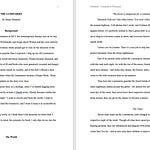Latest News from the Desk of Sooz:
In case you are a fan of my books and haven’t see my latest announcements over on the
, we’ve shared the Illumicrate edition for The Whispering Night. As usual, these are in limited supply! So you’ll want to order as soon as sales open. Get more details below:And in other book news, we are somehow it’s only three months until The Whispering Night hits stores! I do not know where the last year went, honestly. But make sure you pre-order the US edition now if you want the exclusive enamel pin. Details below:
And lastly, in case you missed the announcement back in June, the entire Witchlands series is now available on Kindle Unlimited in the US. So, what better time than now to start reading my super epic, super sweeping, super twisty high fantasy series?
Seriously, though, if you like Dragon Age or Wheel of Time (especially the TV show) or you remain deeply frustrated by the failed Zutara ship, then the Witchlands is perfect for you! 😘
Now onto the main event! Scroll down to read the transcript or hit play above to give it a listen. And I’ll be back with more writing and creative goodness soon!
💚 - Sooz
Links Mentioned:
Transcript:
Hello, everybody. I continue to be right at the end of Witchlight. So close. But I did want to tackle this question before I finish the book. And over audio, just because I think it will be easier.
This might get a BIT RAMBLY, I warn you now. But Alysha asked a great question, which is:
how do you outline a character's emotional arc over more than one book? Or do you find that they don't change much until the final installment?
This is a great question.
No. To the second question, no. I don't wait until the last book for them to change. I don't think readers would enjoy that. I wouldn't enjoy that, and I don't think it makes sense…
Unless maybe you are writing a very serialized type series, such as a detective series, where it's less about the detective—the main sleuth growing and becoming a different person—and each book is really just about who done it. And so you don't really ever need any real character arc.
But I would like to say that most, maybe not most, but many detective novels these days in series do still have growth over the course of the series.
It may be gradual, and it may be less about their their internal journey from flawed self to fulfilled self, but it's not as uncommon as it was…you know back in the day when you would have Hercule Poirot in every mystery, and the man himself never changed. It was just the cast of characters, the location, and the who done it.
So how do you plan for a character to grow over the course of multiple books?
This is hard to answer because every writer is going to be different, and what works for me won't necessarily work for you. And what works for someone else isn't gonna work for me.
I can…Here I am, losing my words. Because some people who are really good at like, sticking to an outline and following along with what they've planned—which honestly is pretty rare. Very, very few writers. I think I've only ever met one that I can think of, in my many years as an author, who actually could, just like, write a bullet point, and then, you know, a bullet point type outline, and then bam, bam, bam. Write it.
Instead, more often, authors we we write, we discover as we're going the outline no longer applies, so we adjust the outline accordingly, and then we move from there.
I do that a lot. I mean, my outline…I do plan and I do outline, but very often, I mean every, well—I've talked about this—every, at least, every 20,000 words, I have to stop and pivot and come up with something new. But it's usually sooner than that, and sometimes it's like, oh, I wrote one scene and that didn't work at all. Go back.
Lots of false starts and retracing my steps to try to figure out why what I plan isn't working or isn't feeling right, and what the new plan might be.
A huge part of this is because I am such a character writer. I get so fully into the emotions of my characters that I become them essentially while I'm drafting. I do not think most people do this, by the way. But to go back to a previous audio I did on strengths and my strengths and how I am such a relationship person, I truly become my characters.
And it can be hard. If I'm writing really intense scenes, it can be draining. And I will, I will…I'm notorious for putting it off. Um, but what this means is that because I am so character focused, that the outlines change, since I will be in the character's head and realize, Oh, that's not what they're gonna do.
I am now here, I am with them. I have written these emotions. I have felt where they’re gonna go next, and that is not what the outline shows.
This also means, though, that very often I cannot predict how they will grow. So I often will start a book, I think I will know what the sort of flaw and defining characteristics of the character are—and on the surface, I certainly do—but where that takes them and how they grow is very rarely what I thought it would be.
And the Witchlands is a fantastic example of this. I very foolishly—don't recommend this—decided to make each book focus on one POV character. Okay, that's not that unusual. But then, because I really wanted to make it hard, I decided to make each book echo that POV character’s character arc.
So for example, in the second book in the series, Windwitch, Merik, who is the Windwitch, must learn to accept his enemies and recognize his own biases at work. And then grow out of seeing what he only wants to see. And so the other characters as well have to…I had to make them each discover that same lesson in their own way and on their own journeys in their own, you know, locations and places.
And so that was a real challenge, because then it required me to figure out the main POV first. So I always this is why—with the Witchlands I have, I write in chunks. I write one person's point of view, then I shift and write another person's point of view, the whole book, and then I shift, do that again and again and again until I have a whole book. And then I weave it together. And it's because I am so dependent on that core point of view defining everybody else's story.
It also is because I am such an emotionally driven writer. If I leave the so-called “river of Merik” to try to flow somewhere else, then I've lost him. I need to stay with him and his emotions until I get wherever it is that he is going. And I have figured out what he is going to grow into and the choices he's going to make, and then I can create everyone from there.
So then Bloodwitch follows Aeduan and his story, etc, etc. And the challenge of this was that everything I thought I had planned for this series—like when I sold the book Truthwitch, and I wrote a detailed synopsis of where everything was going….Yeah, none of that, none of that.
That's not to say that I have deviated in every way. I did plant a lot of things that had to be resolved .Which, oh my gosh, now that I know so much more about myself as a writer—because keep in mind, I started writing this series 11 years ago!—I know better than to do that.
I still like to plant things and figure out how they will come back and how we will fulfill these story promises (be they romantic, be they, you know, little plot things). So in the Witchlands, there's a lot of prophecy stuff that I wanted to play with and subvert and get to over the course of the books.
And so that sort of thing can be a challenge, because maybe someone doesn't end up where I thought they would be, emotionally or physically. And now, uh oh! hmm. Iseult, it's your book, Witchshadow. I was hoping to have two books for you, and I don't, so uh…now I gotta figure it out even more. This is really complicated.
And again, to go back to strengths, my number two strength is Restorative. So I also relish this challenge. I love the extremely complicated puzzle of figuring out how to do everything I set up within the confines of where everybody actually ended up.
And so yeah, many things like some of my favorite cookie scenes—the scenes that I was most excited to write, you know, 11 years ago, when I was planning to see planning the series—maybe are happening in a different location than I originally saw. But they I do eventually get there, and I do eventually get that emotional payoff that I've been working toward. And that's really satisfying as a reader.
It's also really satisfying when I do figure out, finally, how to to get the character, maybe physically where I need them to be on the map, so that they can do the thing I planted three books before. And yeah, it can be really satisfying, but it can also take me a very long time, especially deeper into the series I've gotten.
Book six, Witchlight, oh, boy. That was…that just broke my brain. It broke my brain.
And the other challenge too is that at this point, it is not one person's story only, and so I needed…I was no longer at least tied to everyone having the same sort of arc, but rather, sort of displaying how much they have grown over the course of six books. And these aren't short books, right? These are big books. So really, setting off to the reader: look how far we've come. But hey, we still have a little bit left to learn, or maybe this one lesson we did learn, we didn't get it quite right.
That's something I also came back to in Witchshadow is, like, she learned something, and then did she get it right, though? Does she have to learn a little bit more by the end of the book? Etc, etc.
So all of this is to say that as much as I might try to plan and outline a character's emotional arc over more than one book, I can't. It doesn't mean I don't try. It doesn't mean I don't sit down and sort of have a vision for where I think things are going to go over the course of the series. It just means that I absolutely did not end up where I thought I would be, and that's okay.
That is okay. I am glad because that. is, frankly, far more interesting for me to discover this as I go and feel the things that they feel, the highs and the lows, and be surprised about where that takes me. Like physically, where it takes the characters in the world, and also emotionally, how it moves them and they grow.
But also too, just from a story standpoint, because the choices that I thought they would make, maybe, when I get to that, that turning point in the story, it’s not the choice they would make at all. And wow, oh boy, did that throw off my plan for the series. But hey, I will figure it out later.
And now here, by book six, I get to deal with all of those little pivot points that I wasn't expecting. Phew again. My brain hurts.
And so I guess, to wrap this up: my advice to anyone who is maybe looking for how to plan, you know, a long series arc, I would say, plan it as much as you want, but also be fully cognizant of the fact the plan might change. In fact probably will change, and that's okay.
Oftentimes, following the characters and their emotions and where they want to go will lead you to really cool, unexpected places. And that can be really satisfying in its own way.
Maybe don't do what I do, which is to plant so many clues and foreshadowing that you are locked into certain story choices. Yeah. Again, can be really satisfying, but then also means each book has taken longer than the one before it to do that intense problem solving.
So yeah, plan as much as you want, as much as you feel compelled to plan—or don't, too. If the thought of planning ahead, if all of that freaks you out and makes you not want to write, don't! Just dive in see where they go and where they take you.
Outlining and planning ahead aren't virtuous. Neither is letting your emotions entirely guide you, in writing by the seat of your pants. There is no virtuous way to write and no right or wrong way.
So yeah, I don't know if this helps you at all, Alysha, or if you were even asking just out of curiosity. But that's, that's my answer to you—especially too, if this is… if any of you are newer writers, and you're just starting to learn your own process and explore that and what that looks like, try a detailed outline. See how it goes when you're actually writing. You might hate it, you might love it.
Or try writing by the seat of your pants. You might hate it, you might love it. There's really no way to know until you start trying other people's methods and exploring new ways on your own.
It has taken me many years to accept the way that I write. I talked about this as well in the strengths post recently: I have written my whole life, but I didn't start writing and taking it seriously, trying to get published until, let's see, 2009. So 15 years ago. And of course, when you're learning something new, it can be really sticky at first, as you are consciously what is it? Conscious?
Consciously incompetent. So you know how much you don't know, and it's really hard. (That's the most painful, excruciating stage.)
And then you move into conscious competence, where you know a lot, but you really have to think about it in order to apply.
And for so many years, I tried to do what the internet and all the various places told me I needed to do. I tried outlining, I tried character worksheets. I tried, you know, hammering out a book in a month with fast drafting. I tried everything and felt really like a failure because none of it worked for me. And only by leaning into my natural strengths and learning about writing alignment from Becca Syme did I truly start to accept that, even though I was maybe not aware of it, I was always writing every book the same way.
I might have tried other methods, but I always circled back to the same approach—which is starting with this character. Starting with character, diving into becoming them so deeply, and then pivoting as the story changed and the plans change.
It means my books maybe don't come out as fast as other people's, but at least I'm happy while I do it, and I'm not trying to be something that I'm not. And now I am absolutely in a state of unconscious competence where I don't have to think about what I do. I know how all the pieces of story combine and interact. I know how I work best.
It doesn't mean books are easy, though, okay, like, I should add that. That doesn't mean suddenly that writing books is easy. No, it is not. Oh, I cannot emphasize that enough. Writing Witchlight has been a brain breaker. It is my 13…It will be my 13th published book. And I, I will not say it was easy. At all.
But that's okay. I'm not afraid of hard work. I'm not afraid of a little pain to get the reward. I just know that I can have less pain by leaning into my natural, default, intuitive way of writing, and that unconscious competence has taken many, many years to build to where I am right now.
So yeah, that long winded tangent was all to say that if you don't yet know, try lots of things. Learn about character arc and growth. Study your favorite series, be they, be they books, be they film, TV, gaming even. (One of my favorite character arcs is from the Dragon Age franchise. It's a character in Inquisition, and I will not share who, but seeing his character grow over the course of this of the game is just was so fulfilling. It's so fulfilling.)
And studying how other people do it can help you really learn to start applying it to your own work, and maybe you too will attain unconscious competence one day. The only way to do that is to just keep trying and keep learning.
So thank you all for listening. All right, back to Witchlight I can do it, right? I can do it! Yes!
À bientôt!














